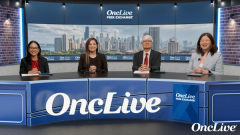
Opinion|Videos|July 9, 2024
Predictors of Immunotherapy Response in Limited and Extensive SCLC
Afshin Dowlati, MD, explores which patients with small cell lung cancer experience the most significant benefit from immunotherapy in both limited and extensive stage disease, while also examining potential clinical or molecular characteristics that could serve as predictors of prolonged survival.
Advertisement
Episodes in this series

- How do we advance the field on which patients with SCLC derive the greatest benefit from IO in both limited stage and extensive stage disease?
- Do we yet know which clinical or molecular characteristics might predict extended survival in ES-SCLC, such as platinum sensitivity or PD-L1 expression?
- For those who experience extended survival, do you continue immunotherapy and how long is that interval?
Advertisement
Latest CME
Advertisement
Advertisement
Trending on OncLive
1
Long-Term Cilta-Cel Data Show Low Rates of PFS Events in Standard-Risk R/R Myeloma
2
Real-World Data Support Clinical Benefit With Lifileucel in Previously Treated Advanced Melanoma
3
Dr Riedell on the Long-Term Efficacy of Tisa-Cel in R/R Follicular Lymphoma
4
Single-Center, Retrospective Data Show Low Rate of Lifileucel Infusion Following Referral in Advanced Melanoma
5



































